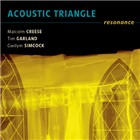Home » Jazz Articles » Album Review » Acoustic Triangle: Resonance
Acoustic Triangle: Resonance
In a 2003 interview, drummer Peter Erskine spoke about playing in concert halls with such inherently good acoustics that PA systems were unnecessary. "audiences love it, they absolutely love it. The world has gotten so noisy, and things have gotten so dense and assaultive, that people are grateful for a chance to rest their ears, rest their spirits and maybe their psyches."
Acoustic Triangle understands, perhaps more than most, the significance of Erskine's words. Formed by British bassist Malcolm Creese with woodwind multi-instrumentalist Tim Garland at the turn of the decade, the trio's name is no exaggeration. Not only are their performances completely acoustic with no PA system to be found, their records are equally organic, recorded in churches with stunning natural resonance and minimal miking.
Resonance—the trio's third release and the second to feature the line-up of Creese, Garland and twenty-something pianist Gwilym Simcock—is aptly-titled, referring not only to the richly-textured aural landscape they create, but also the deeply evocative chamber jazz they make. Previous discs were recorded live in church halls with no editing or post-processing, but Resonance is the first album to be recorded live in front of an audience.
That the three musicians are experienced in classical and jazz worlds is immediately evident on Garland's arrangement of 17th century composer Gregori Allegri's "Miserere Mei." The room is truly the fourth member of the group, rich in natural reverberation as Creese's warm arco is joined by Simcock on French horn and Garland on soprano saxophone. Things become more intimate when Simcock switches to piano and the trio begins taking more improvisational liberties. That they can expand on Allegri's beautifully spiritual music without tarnishing its lyrical innocence is demonstrative of the distinctive language the trio has developed in surprisingly little time.
The trio also continues its tradition of covering trumpeter Kenny Wheeler—in this case "Everyone's Song But My Own," one of the most enduring songs of Wheeler's large oeuvre. While Creese is most often heard either in support of Garland and Simcock or as an equal contrapuntal partner, he begins the tune with an imaginatively rhythm-based solo reminiscent of Dave Holland—evidence of his sadly undervalued status outside the UK. When Garland and Simcock enter it becomes the disc'"s most overtly swinging track, with Simcock's solo mature beyond his years and Garland's lithe yet robust tenor reason enough why Chick Corea continues to enlist him for projects including Origin and the upcoming The Ultimate Adventure (Stretch, 2006).
But Acoustic Triangle's real strength lies in Garland and Simcock's original compositions. Garland's bright "Bourdion" references one of his seminal influences, Ralph Towner, the combination of soprano sax, piano and bass feeling distinctly Oregon-esque. Simcock's "Ritual" inhabits darker and more impressionistic territory, with Garland's bass clarinet and Creese's arco bass developing Simcock's arcing theme.
It's the combination of detailed through-composition and seamless improvisation that distinguishes Acoustic Triangle, and with Resonance the trio continues to develop its own language—chamber jazz as natural and compelling as it is complex and vividly multi-layered.
Track Listing
Miserere Mei; Bourdion; From the Land; Everyone's Song But My Own; Ritual; Nutshell; Solo Piano Interlude; As the Boy Gathers His Dreams; Fundero; Under Milkwood.
Personnel
Malcolm Creese
bassMalcolm Creese: double-bass; Tim Garland: tenor and soprano saxophones, bass clarinet; Gwilym Simcock: piano, French horn.
Album information
Title: Resonance | Year Released: 2005 | Record Label: Audio-B Ltd.
< Previous
Viaticum
Next >
The Worker's Dance
Comments
Tags
For the Love of Jazz
 All About Jazz has been a pillar of jazz since 1995, championing it as an art form and, more importantly, supporting the musicians who create it. Our enduring commitment has made "AAJ" one of the most culturally important websites of its kind, read by hundreds of thousands of fans, musicians and industry figures every month.
All About Jazz has been a pillar of jazz since 1995, championing it as an art form and, more importantly, supporting the musicians who create it. Our enduring commitment has made "AAJ" one of the most culturally important websites of its kind, read by hundreds of thousands of fans, musicians and industry figures every month.




















